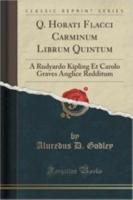
‘Forgotten Books’ Classic Reprint (2015) p/b 64pp £9.59 (ISBN 9781115764575)
This curious jeu d’esprit, published by Oxford in 1920, purporting to contain fifteen odes by Horace, and mimicking in format an Oxford Classical Text, was the production of Oxford’s Public Orator, A.D. Godley, with Ronald Knox, J.U. Powell, and A.B. Ramsay. Godley provided a longish (Latin) Praefatio, with much heavy humour about the ‘discovery’ of the MSS (so the text is accompanied by an apparatus criticus in which names such as Bentley and Lachmann appear) in, e.g. the Badensi Grosspaniandrumpinacotheca. The ‘odes’, in a variety of lyric metres, are cleverly done—although no individual ascriptions are given, Ronald Knox was the prime mover—with subjects lightly touching on such contemporary matters as British Summer Time; the (enjoyable) verse translations, of which only three are by Kipling, keep reasonably close to the Latin in a light style somewhat reminiscent of C.S. Calverley or Rogers’ translations of Aristophanes.
Here is one of the less extended offerings, by A.B. Ramsay, in Alcaic metre, with (slightly abbreviated) apparatus criticus:
Natura rerum quae sit odoribus
intenta sunt quos porticus audiat
monstrare, vel mixtis duabus
tertia qua ratione peior
confletur auris. hic potius rotas
ignemque laudans, unde sit impetus
maior laborabit volutis
turbinibus rapidoque rhombo.
Pars efficaces gignere vel luem
sanare nostri corporis incolas
propagat enatamque pascit
sponte sua segetem venenis
incurioso non mediocriter
et nunc et horis damna trahentibus
alaene me vectent an axes
Brundisium, mihi, cui quietum
fervore pectus non nisi Pindari,
Naso, per omnes incaluit dies,
haec prorsus exaudita frigent,
nec magis alliciunt eodem,
scrutante quam si mente profundius
certo futuri quid placeant Deo,
fert ligna supplendo focorum
iunctus amicitia magister.
8 rapidoque rhombo: Orelli’s restoration for MSS subitoque bombo, solitoque bombo, rapidaque Roma 19 prorsus: MSS Morsus, Mopsus, Marsus 21 profundius Orelli for MSS. profundis.
The translation is by Kipling:-
There are those whose studies are of smells,
Who to attentive schools rehearse
What something mixed with something else
Makes something worse.
Some cultivate in broths impure
The clients of our body; these,
Increasing without Venus, cure
Or cause disease.
Others the heated wheel extol,
and all its offspring, whose concern
how to make it farthest roll
And fastest turn.
Me, much incurious if the hour
Present, or to be paid for, brings
Me to Brundisium by the power
Of wheels or wings,
me, in whose breast no flame hath burned
Lifelong, save that by Pindar lit,
Such lore leaves cold; nor have I turned
Aside for it,
more than when, sunk in thought profound
Of what the unaltered Gods require,
My steward (friend but slave) brings round
Logs for my fire.
This kind of extended pastiche is always likely to give more pleasure to its perpetrators than to its readers: was it, perhaps, a reaction to the First World War so recently ended? It is unique, and it is inconceivable that such a technopaignion could appear today: even if it did, readers, one fears, would be few.
Colin Leach
